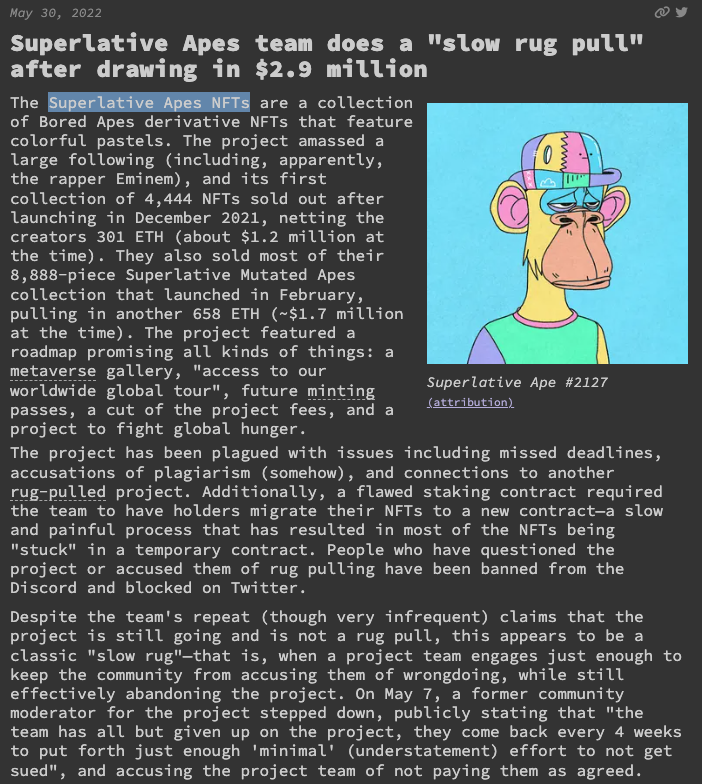Massachusetts-based 28-year-old software engineer and Wikipedia editor Molly White, who has a blog called “Web3 Is Going Just Great“, is — according to Washington Post — “fast becoming the cryptocurrency world’s biggest critic.”
Here is some information about White from her Wikipedia page:
“White edits Wikipedia under the username ‘GorillaWarfare’. She began editing as a preteen and became a site administrator while still in high school… White had made over 100,000 edits as of early 2022…
“In 2021, White started the Wikipedia article on Web3, an idea for a Web based on decentralized blockchains. Despite the concept’s hype on social media with sizable venture capital investment, she found the term to be ill-defined and associated with numerous scams, frauds, and rug pulls affecting consumer investors.
“She started a website, Web3 Is Going Just Great, in December 2021 to document these cases. The website provides a timeline of Web3 and cryptocurrency projects and the losses to their investors… In February 2022, White urged the Wikimedia Foundation to cease accepting donations via cryptocurrency. White’s proposal was adopted in early May after the Wikipedia community supported it, 71% to 29%, in a poll.“
Here is how White defines the term “Web3” on her blog:
“One of the most distinguishing features of ‘web3’ is the sheer level of handwaviness surrounding it. While you can find no end of press releases, Twitter crypto bros, and venture capitalists extolling the virtues of web3, you will have a much harder time finding any definition that’s not so full of buzzwords that it becomes meaningless.
“Generally speaking, web3 is an umbrella term to refer to the ‘uture of the Internet’, which believers say will be decentralized and based on the blockchain. Proponents tend to tout how data won’t be controlled by ‘Big Tech’, and how it will be uncensorable and egalitarian. There is, however, no shortage of examples in this timeline of how many ‘web3’ projects are indeed centralized in similar ways to Big Tech, as well as instances where ‘uncensorable’ or ‘unmodifiable’ platforms have removed or modified data.“
On May 17, Dogecoin co-creator Jackson Palmer interviewed for the first episode of his “GRIFTONOMICS” podcast:
On her blog, one of the most recent posts (published on May 30) is about the Superlative Apes NFT collection:
On May 29, the Washington post published an article about White, in which they said that she is “fast becoming the cryptocurrency world’s biggest critic.”
White told the Washington Post:
“Most of my disdain is reserved for the big players who are marketing this to a mainstream audience as though it’s an investment, often promising to be a ticket out of a really tough financial spot for people who don’t have many options. It’s very predatory...
“People are putting in money that they can’t afford to lose. They thought this might be their ticket out of poverty or they can finally stop working that minimum wage job and then all their savings are gone.“
Newsletter
To make sure you receive a FREE weekly newsletter that features highlights from our most popular stories, click here.
Disclaimer
The views and opinions expressed by the author, or any people mentioned in this article, are for informational purposes only, and they do not constitute financial, investment, or other advice. Investing in or trading cryptoassets comes with a risk of financial loss.
Image Credit
Featured Image by “Maklay62” via Pixabay.com










